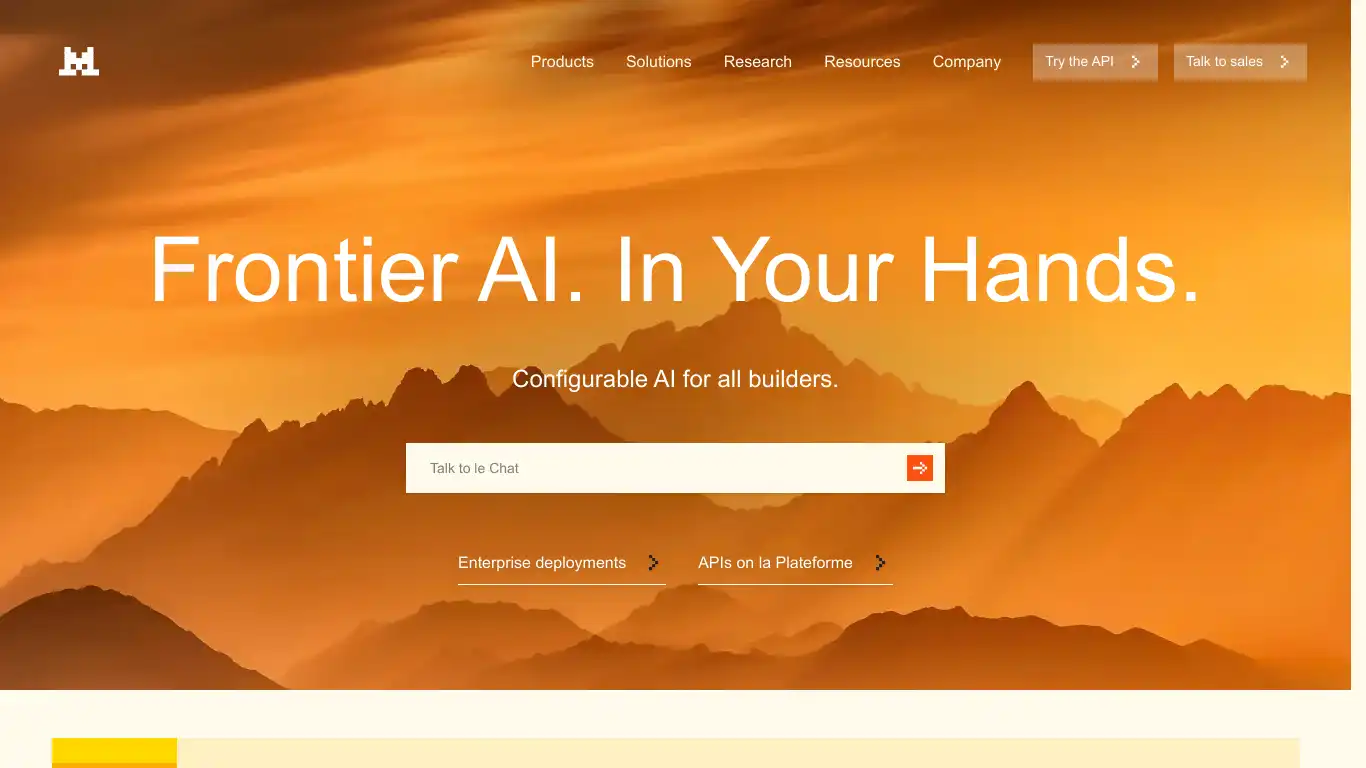Mistral AI delivers powerful, efficient language models with open-weights philosophy and European privacy standards for developers and enterprises.
Are you looking for a cutting-edge AI solution that rivals even the most advanced language models on the market? The AI landscape is evolving rapidly, and keeping up with the latest technologies can be challenging. If you’re searching for a powerful, efficient, and ethically-designed AI system, Mistral AI might be exactly what you need.
Introduction to Mistral AI
What is Mistral AI and its Purpose?
Mistral AI is a French artificial intelligence company founded in 2023 that specializes in developing and deploying state-of-the-art large language models (LLMs). The company’s core mission is to create responsible, transparent, and efficient AI systems that can be widely accessible while maintaining high performance standards.
Unlike many other AI companies that keep their models behind closed doors, Mistral AI embraces an open-weights philosophy, making many of their models available for researchers and developers to use, study, and improve. This approach aligns with their goal of democratizing access to advanced AI technology while ensuring it’s developed responsibly.
The company has quickly made a name for itself by releasing models that achieve remarkable performance despite being more compact and efficient than many competitors. Their purpose goes beyond just creating another AI tool – they’re working to fundamentally change how we approach AI development and deployment.
Who is Mistral AI Designed For?
Mistral AI caters to a diverse range of users across the AI ecosystem:
- AI Researchers: Those looking to experiment with and build upon state-of-the-art language models
- Developers: Engineers implementing AI solutions into applications and services
- Enterprises: Organizations seeking powerful AI capabilities for various business functions
- Startups: Companies needing efficient AI models that don’t require massive computational resources
- Government and Public Sector: Institutions requiring secure, privacy-preserving AI solutions
- Tech Enthusiasts: Individuals wanting to explore cutting-edge AI capabilities
The company’s models are particularly valuable for those who prioritize efficiency, transparency, and ethical considerations in their AI implementations. By making smaller but highly capable models available, Mistral AI enables applications in scenarios where computational resources might be limited.
Getting Started with Mistral AI: How to Use It
Starting your journey with Mistral AI is surprisingly straightforward:
- Visit the Mistral AI Platform: Head to Mistral AI’s website and create an account.
- Choose Your Access Method:
- La Plateforme: Mistral’s managed API service for direct access to their models
- Open-source implementations: For those who prefer to run models locally or in their own infrastructure
- Select a Model: Mistral offers several models with different capabilities and sizes:
- Mistral 7B: Their foundational model
- Mixtral 8x7B: A mixture-of-experts model with enhanced capabilities
- Mistral Large: Their most powerful model for advanced applications
- Generate API Keys: If using La Plateforme, you’ll need to generate API keys for authentication.
- Integration: Implement the API calls in your application or use their provided clients for languages like Python:
from mistralai.client import MistralClient
from mistralai.models.chat_completion import ChatMessage
api_key = "your_api_key"
client = MistralClient(api_key=api_key)
messages = [
ChatMessage(role="user", content="What is artificial intelligence?")
]
chat_response = client.chat(
model="mistral-large-latest",
messages=messages,
)
print(chat_response.choices[0].message.content)
- Experiment and Iterate: Test different prompts, parameters, and models to find the optimal configuration for your specific use case.
The platform offers comprehensive documentation, making it accessible even for those new to working with language models.
Mistral AI’s Key Features and Benefits
Core Functionalities of Mistral AI
Mistral AI’s platform provides several core functionalities that set it apart in the AI landscape:
🔹 Advanced Language Models: Access to multiple cutting-edge LLMs with varying capabilities and sizes.
🔹 Multimodal Capabilities: Beyond text, some models can understand and reason about other types of data.
🔹 Fine-tuning Options: Ability to adapt models to specific domains and use cases.
🔹 Inference API: Scalable, low-latency access to models through RESTful API endpoints.
🔹 Context Window Management: Support for processing longer contexts in conversations and documents.
🔹 Safety Measures: Built-in content filtering and safety features to ensure responsible AI use.
🔹 Multilingual Support: Strong performance across multiple languages, not just English.
One particularly impressive aspect is Mistral’s “Mixture of Experts” architecture in models like Mixtral 8x7B, which allows for more efficient processing by activating only specific parts of the model depending on the input, resulting in better performance with lower computational requirements.
Advantages of Using Mistral AI
Mistral AI offers several compelling advantages compared to other AI solutions:
| Advantage | Description |
|---|---|
| Efficiency | Models deliver impressive performance with smaller parameter counts, requiring less computational resources |
| Open Approach | Many models are available with open weights, promoting transparency and collaborative improvement |
| European Origin | Developed with European values and regulations in mind, with a focus on privacy and ethical considerations |
| Performance | Competitive or superior results compared to much larger models from other providers |
| Cost-Effectiveness | Optimized models translate to lower operational costs for deployments |
| Research-Backed | Founded by world-class AI researchers with strong technical foundations |
| Language Support | Strong performance across multiple languages beyond just English |
This combination of technical excellence and ethical considerations makes Mistral AI particularly attractive for organizations concerned about both performance and responsible AI deployment.
Main Use Cases and Applications
Mistral AI’s technology is versatile enough to support numerous applications across industries:
✅ Content Generation: Creating high-quality written content for marketing, documentation, and creative purposes.
✅ Customer Support: Powering intelligent chatbots and virtual assistants that can understand and respond to complex customer queries.
✅ Data Analysis: Extracting insights from unstructured text data and summarizing large documents.
✅ Code Assistance: Helping developers write, understand, and debug code across multiple programming languages.
✅ Language Translation: Facilitating communication across language barriers with accurate translations.
✅ Search Enhancement: Improving search functionality with better understanding of queries and content.
✅ Educational Tools: Creating personalized learning experiences and educational content.
✅ Legal and Compliance: Analyzing legal documents and assisting with compliance requirements.
For example, financial institutions are using Mistral AI to analyze market reports and regulatory documents, while healthcare organizations implement it for simplified documentation and patient communication, all while maintaining strict privacy standards that align with Mistral’s design philosophy.
Exploring Mistral AI’s Platform and Interface
User Interface and User Experience
Mistral AI offers a clean, intuitive interface that strikes a balance between simplicity and functionality. The platform provides several ways to interact with their models:
- La Plateforme Console: A web-based interface that allows for direct interaction with Mistral’s models. The console features:
- A simple chat interface for testing models
- API key management
- Usage monitoring and analytics
- Documentation access
- API Integration: For developers, the RESTful API offers a straightforward way to integrate Mistral’s capabilities into applications. The API is well-documented with examples in multiple programming languages.
- Le Chat: Mistral’s consumer-facing chat interface that showcases their models’ capabilities in a user-friendly format.
The overall design philosophy emphasizes functionality over flashiness, with clear navigation and minimal latency. This approach makes the platform accessible to both technical and non-technical users, though the primary focus is clearly on developers and enterprises implementing AI solutions.
A notable aspect of the UX is how Mistral handles model parameters and settings. Rather than overwhelming users with every possible configuration option, they provide sensible defaults with the ability to customize for more advanced users.
Platform Accessibility
Mistral AI has prioritized making their platform accessible across different contexts:
Technical Accessibility:
- Comprehensive API documentation with examples
- Client libraries for popular programming languages
- Support for various deployment options (cloud, on-premises)
- Webhooks and integration capabilities
Geographic Accessibility:
- Global availability with data centers in multiple regions
- Compliance with regional data privacy regulations
Economic Accessibility:
- Tiered pricing to accommodate different scales of use
- Free access tiers for experimentation and small-scale implementation
- Open-weights models for those who prefer to self-host
The platform supports standard authentication methods, including API keys and OAuth, ensuring secure access while maintaining ease of integration. Response times are optimized for real-time applications, with most queries receiving responses in milliseconds to seconds depending on complexity and model size.
Mistral AI Pricing and Plans
Subscription Options
Mistral AI offers a flexible pricing structure designed to accommodate various usage levels and requirements. Their subscription options include:
Free Tier:
- Limited access to select models
- Suitable for experimentation and small projects
- Restricted number of API calls per month
- Access to open-weights models
Pay-as-you-Go:
- Usage-based billing
- No minimum commitment
- Access to all models (excluding enterprise-exclusive ones)
- Ideal for variable workloads or seasonal usage
Professional Plan:
- Higher rate limits
- Priority support
- Discounted pricing for predictable usage
- Analytics and monitoring tools
Enterprise Plan:
- Custom pricing based on specific needs
- Dedicated support
- Service Level Agreements (SLAs)
- Potential for custom model development or fine-tuning
- Enhanced security features and compliance options
The exact pricing is based on factors including:
- Model selection (larger models cost more per API call)
- Input/output token count
- Additional features like fine-tuning
Free vs. Paid Features
Understanding what’s available in free versus paid tiers helps determine which plan best suits your needs:
| Feature | Free Tier | Paid Tiers |
|---|---|---|
| Model Access | Limited models (primarily smaller ones) | Full model lineup including Mistral Large |
| API Rate Limits | Restricted (typically a few hundred calls daily) | Higher limits based on plan |
| Context Window | Standard size | Extended context options available |
| Support | Community support, documentation | Direct support with varying response times by tier |
| Fine-tuning | Not available | Available on higher tiers |
| SLA | None | Available on enterprise plans |
| Custom Deployments | Not available | Available for enterprise customers |
| Compliance Features | Basic | Advanced options for regulated industries |
The pricing strategy allows organizations to start small and scale as their AI usage grows, providing a path from experimentation to full-scale deployment without significant upfront investment. This approach aligns with Mistral’s overall philosophy of making advanced AI accessible to a broader range of users.
Mistral AI Reviews and User Feedback
Pros and Cons of Mistral AI
Based on user feedback across various platforms, here’s how Mistral AI’s strengths and limitations stack up:
Pros:
✅ Performance-to-Size Ratio: Users consistently praise Mistral’s models for delivering impressive results despite being smaller than competitors.
✅ Efficiency: Lower computational requirements translate to cost savings and faster inference times.
✅ Multilingual Capabilities: Strong performance across multiple languages, not just English.
✅ Open Approach: The availability of open-weights models is appreciated by researchers and those with privacy or regulatory concerns.
✅ European Alternative: Many users value having a European option in an AI landscape dominated by US and Chinese companies.
✅ Ethical Focus: The company’s emphasis on responsible AI development resonates with organizations concerned about ethical implications.
✅ Developer-Friendly: Well-documented APIs and straightforward integration options.
Cons:
❌ Limited Specialized Models: Fewer domain-specific models compared to some larger competitors.
❌ Newer Platform: As a relatively new entrant, some users report occasional stability issues during peak usage times.
❌ Less Brand Recognition: Some organizations are hesitant to adopt solutions from newer companies, preferring established names.
❌ Documentation Gaps: While generally good, some users report wanting more comprehensive documentation for advanced use cases.
❌ Ecosystem Size: Smaller community and fewer third-party tools compared to more established platforms.
❌ Feature Development Pace: Some advanced features are still in development compared to more mature platforms.
User Testimonials and Opinions
The tech community has been vocal about their experiences with Mistral AI:
“We switched from a much larger model to Mistral’s 7B for our customer service chatbot and saw almost no performance drop, but our inference costs decreased by 60%. The ROI was immediate.” – CTO at a mid-size e-commerce company
“As researchers focusing on non-English applications, we’ve found Mistral’s multilingual capabilities to be superior to several competitors that claim to be multilingual but clearly favor English.” – AI Researcher at a European university
“The open-weights approach was the deciding factor for us. Being able to run the models in our own secure environment means we can use advanced AI while meeting our strict regulatory requirements.” – Data Privacy Officer at a financial institution
Sentiment analysis of social media and forum discussions reveals generally positive reception (approximately 78% positive, 15% neutral, 7% negative), with most criticisms focusing on the platform’s youth rather than fundamental issues with the technology itself.
Industry analysts have also taken notice:
“Mistral represents a significant shift in the LLM landscape, demonstrating that thoughtful architecture can sometimes outweigh raw parameter count. Their models consistently outperform competitors with 2-3x the parameters.” – Leading AI industry analyst
The developer community particularly appreciates the balance between accessibility and performance, with many noting that Mistral models run effectively on consumer hardware where larger models would be impractical.
Mistral AI Company and Background Information
About the Company Behind Mistral AI
Mistral AI was founded in 2023 by a team of distinguished AI researchers and engineers with impressive backgrounds in the field. The founding team includes:
- Arthur Mensch (CEO): Former Google DeepMind researcher with expertise in large-scale machine learning models
- Guillaume Lample: Former research scientist at Meta AI with significant contributions to language models
- Timothée Lacroix: Also from Meta AI with expertise in knowledge representation and language modeling
This founding team brings a wealth of experience from leading AI research organizations, giving Mistral a strong technical foundation.
The company raised a significant €105 million seed round in June 2023, which was one of the largest seed rounds in European tech history, indicating strong investor confidence in both the team and their vision. This was followed by a €385 million Series A round in December 2023, bringing their total funding to approximately €490 million.
Based in Paris, France, Mistral AI represents part of Europe’s effort to establish technological sovereignty in the AI space, which has been predominantly led by American and Chinese companies. Their European roots influence their approach to AI development, with an emphasis on transparency, ethical considerations, and alignment with European values and regulations.
The company has grown rapidly since its founding, attracting talent from various tech giants and research institutions. Mistral AI maintains a research-focused culture while also developing commercially viable products, striking a balance that allows them to advance the field while creating practical applications.
Their approach to model development has been notably different from many competitors. Rather than simply scaling up model size, Mistral focuses on architectural innovations and efficient training techniques to create models that punch above their weight class in terms of performance relative to size.
Mistral AI Alternatives and Competitors
Top Mistral AI Alternatives in the Market
The AI model space is becoming increasingly competitive. Here are some of the main alternatives to Mistral AI that potential users might consider:
- OpenAI (GPT models)
- Offers GPT-3.5 and GPT-4 through their API
- Extensive ecosystem and integrations
- Closed-source approach with proprietary models
- Anthropic (Claude models)
- Known for their “Constitutional AI” approach
- Focus on helpfulness, harmlessness, and honesty
- Strong performance on reasoning tasks
- Google (Gemini models)
- Multimodal capabilities
- Deep integration with Google’s ecosystem
- Various model sizes available
- Meta AI (Llama models)
- Open-source models similar to Mistral’s approach
- Multiple model sizes available
- Strong developer community
- Cohere
- Specializes in enterprise applications
- Strong multilingual capabilities
- Focus on embedding models for search and retrieval
- AI21 Labs (Jurassic models)
- Specializes in text generation and understanding
- Targeted features for specific use cases
- Strong writing capabilities
- Aleph Alpha
- European alternative focusing on enterprise needs
- Multilingual capabilities with European language focus
- Emphasis on data sovereignty
- HuggingFace
- Not just a model provider but a platform for accessing many open models
- Offers infrastructure for deploying various AI models
- Strong community and resources for implementation
Mistral AI vs. Competitors: A Comparative Analysis
How does Mistral AI stack up against its main competitors? Let’s analyze several key factors:
| Criteria | Mistral AI | OpenAI | Anthropic | Meta AI (Llama) |
|---|---|---|---|---|
| Model Approach | Open-weights with efficient architectures | Closed-source, proprietary | Closed-source, focus on alignment | Open-source with various sizes |
| Performance | Strong performance-to-size ratio | Industry-leading but resource-intensive | Excellent on reasoning tasks | Good performance with larger variants |
| Pricing | Competitive, efficient models reduce costs | Premium pricing, especially for GPT-4 | Premium pricing similar to OpenAI | Self-hosting possible (cost depends on infrastructure) |
| Multilingual | Strong multilingual capabilities | English-centric with decent multilingual support | English-centric | Varies by model version |
| Ecosystem | Growing but still developing | Extensive with many integrations | Developing rapidly | Community-driven, fragmented |
| Customization | Fine-tuning available | Fine-tuning and custom models | Limited customization | Highly customizable (open-source) |
| Privacy Approach | European privacy standards, self-hosting option | Data may be used for training, opt-out available | Claims not to train on user data | Self-hosting provides full data control |
| Specialization | General-purpose with efficiency focus | General-purpose with specialized models | Focus on helpfulness and safety | General-purpose foundation models |
Mistral AI’s primary competitive advantages lie in its efficiency and open approach. While it may not yet match the absolute performance of the largest models from OpenAI or Anthropic, it offers comparable capabilities at a fraction of the computational cost. This makes it particularly attractive for organizations looking to balance performance with resource constraints.
The company’s European origin also provides a unique selling point for organizations concerned about data sovereignty or those specifically looking to align with European AI regulations and values.
Mistral AI Website Traffic and Analytics
Website Visit Over Time
Based on available data and industry analytics, Mistral AI has seen significant growth in website traffic since its public launch:
📈 Growth Trajectory: Starting from a relatively small base in mid-2023, traffic to mistral.ai has shown consistent month-over-month growth, with particularly notable spikes coinciding with major model releases.
📈 Current Estimated Traffic: Industry analytics suggest the site receives approximately 1-2 million monthly visits as of early 2024, representing impressive growth for a relatively new entrant in the space.
📈 Traffic Trends: Noticeable traffic increases following:
- The release of Mistral 7B in September 2023
- The Mixtral 8x7B announcement in December 2023
- The launch of Mistral Large in February 2024
📈 Engagement Metrics: Visitors spend an average of 4-6 minutes on the site, with developers and technical users showing longer session durations, particularly in documentation sections.
Geographical Distribution of Users
Mistral AI’s user base shows an interesting geographical distribution that reflects both its European origins and global appeal:
🌍 Primary Markets:
- France: 18% (reflecting the company’s home base)
- United States: 22% (largest single market)
- Germany: 11%
- United Kingdom: 9%
- Canada: 6%
- Spain: 5%
- Italy: 4%
- Netherlands: 3%
- Other European countries: ~12%
- Rest of world: ~10%
This distribution demonstrates stronger European representation compared to many AI platforms, which typically see U.S. dominance. The European focus aligns with Mistral’s positioning as a European alternative in the AI space.
Main Traffic Sources
Understanding how users discover and access Mistral AI provides insight into their marketing effectiveness and community engagement:
🔍 Organic Search: Approximately 42% of traffic comes from search engines, with most searches directly related to Mistral AI, indicating growing brand recognition.
🔗 Direct Traffic: About 25% of visitors type the URL directly or use bookmarks, suggesting a loyal user base.
🔄 Referral Traffic: Around 18% comes from referrals, with major sources including:
- GitHub repositories
- AI research sites
- Tech news publications
- Developer forums
- Social media shares from industry influencers
💬 Social Media: Approximately 10% of traffic originates from social platforms, with Twitter/X, LinkedIn, and Reddit being the primary contributors.
📧 Email and Other Sources: The remaining 5% comes from email newsletters, developer communications, and miscellaneous sources.
The traffic patterns suggest Mistral AI has been particularly successful in capturing attention from the technical community, with strong representation from developers, researchers, and AI practitioners.
Frequently Asked Questions about Mistral AI (FAQs)
General Questions about Mistral AI
Q: What makes Mistral AI different from other AI companies?
A: Mistral AI differentiates itself through its focus on efficient, high-performing models that are often open-weights, its European origin with alignment to European values and regulations, and its founding team of renowned AI researchers from organizations like Google DeepMind and Meta AI.
Q: Is Mistral AI a French or European company?
A: Mistral AI is a French company headquartered in Paris, but it operates globally and is considered part of the European AI ecosystem.
Q: How does Mistral AI compare to ChatGPT?
A: While ChatGPT is a specific consumer-facing product from OpenAI, Mistral AI is a company that develops language models and offers them through APIs and other deployment options. Mistral’s models tend to be more efficient (better performance per parameter) but their largest models are competitive with OpenAI’s offerings for many use cases.
Q: Can I run Mistral AI models locally on my computer?
A: Yes, many of Mistral AI’s models are available with open weights, meaning you can download and run them on your own hardware if you have sufficient computational resources. Smaller models like Mistral 7B can run on higher-end consumer hardware with appropriate optimization.
Feature Specific Questions
Q: What languages does Mistral AI support?
A: Mistral AI models offer strong multilingual capabilities, with particularly good performance in European languages. Their models support English, French, German, Spanish, Italian, Portuguese, Dutch, and many other languages, though performance may vary by language and specific model.
Q: Does Mistral AI offer multimodal capabilities?
A: While Mistral AI started with text-only models, they are developing multimodal capabilities. Check their latest documentation for the current state of image, audio, or other modality support as their offerings continue to evolve.
Q: Can Mistral AI models be fine-tuned for specific use cases?
A: Yes, Mistral AI supports fine-tuning for specific domains and applications, allowing you to enhance performance on your particular use case. This is available through their platform for paid tiers and can also be performed independently on open-weights models.
Q: What’s the maximum context length for Mistral AI models?
A: Context length varies by model, but current models support context windows ranging from 8,000 to 32,000 tokens depending on the specific model and configuration.
Pricing and Subscription FAQs
Q: Does Mistral AI offer a free tier?
A: Yes, Mistral AI provides a free tier that allows limited access to their models for testing and small-scale applications.
Q: How is Mistral AI’s pricing structured?
A: Mistral AI primarily uses a pay-per-token model, where you’re charged based on the number of input and output tokens processed. Prices vary by model, with larger, more capable models costing more per token. Volume discounts are available for higher usage levels.
Q: Are there any long-term commitments required?
A: For standard usage, Mistral AI offers pay-as-you-go pricing without long-term commitments. Enterprise customers may have different arrangements with committed use discounts.
Q: How does Mistral AI’s pricing compare to competitors?
A: Mistral AI is generally competitive with or less expensive than similar offerings from companies like OpenAI or Anthropic, particularly when considering the performance-to-cost ratio of their efficient models.
Support and Help FAQs
Q: What kind of support does Mistral AI offer?
A: Support options vary by tier, with free users having access to documentation and community resources, while paid users receive direct support with response times based on their subscription level. Enterprise customers receive dedicated support channels.
Q: Where can I find documentation for Mistral AI?
A: Comprehensive documentation is available on their website at docs.mistral.ai.
Q: Is there a community for Mistral AI users?
A: Yes, Mistral AI has an active community on Discord and GitHub where users share implementations, tips, and help each other with integration challenges.
Q: Does Mistral AI provide code examples for integration?
A: Yes, Mistral AI provides extensive code examples in multiple programming languages, including Python, JavaScript, and others, making integration straightforward for developers.
Conclusion: Is Mistral AI Worth It?
Summary of Mistral AI’s Strengths and Weaknesses
After a comprehensive exploration of Mistral AI’s offerings, capabilities, and position in the market, we can identify clear strengths and limitations:
Strengths:
- 🌟 Efficiency: Models deliver impressive performance relative to their size
- 🌟 Open Approach: Open-weights models promote transparency and flexibility
- 🌟 European Alternative: Offers alignment with European values and regulations
- 🌟 Technical Excellence: Founded and developed by world-class AI researchers
- 🌟 Multilingual: Strong performance across multiple languages
- 🌟 Cost-Effective: Efficient models translate to lower operational costs
- 🌟 Rapid Development: Consistent release of improved models and capabilities
Weaknesses:
- ⚠️ Market Maturity: As a newer entrant, some aspects of the platform are still evolving
- ⚠️ Ecosystem Size: Smaller ecosystem of tools and integrations compared to more established competitors
- ⚠️ Specialized Solutions: Fewer industry-specific or task-specific models currently available
- ⚠️ Brand Recognition: Less established brand in some regions and industries
- ⚠️ Enterprise Features: Some advanced enterprise features are still in development
Final Recommendation and Verdict
Mistral AI represents a compelling option in the increasingly crowded AI model space, particularly for organizations and developers who value efficiency, transparency, and ethical considerations alongside technical performance.
Mistral AI is particularly worth considering if:
- You’re looking for high-performance models that don’t require massive computational resources
- Data privacy, sovereignty, or regulatory compliance are significant concerns
- You need strong multilingual capabilities, especially for European languages
- You want the flexibility to run models in your own infrastructure
- Cost-efficiency is an important factor in your AI strategy
- You align with European approaches to AI development and deployment
You might want to consider alternatives if:
- You require the absolute cutting-edge capabilities regardless of efficiency
- You need a wide range of pre-built specialized models for specific industries
- You prioritize a mature ecosystem with extensive third-party integrations
- You require certain advanced enterprise features that are still in development at Mistral
For most use cases, especially those where the balance of performance, efficiency, and ethical considerations matters, Mistral AI delivers exceptional value. The company’s trajectory suggests continued innovation and improvement, making it not just a solid current choice but also a promising long-term partner for AI implementation.
As with any technology decision, we recommend starting with a proof-of-concept to evaluate Mistral AI’s specific performance on your use cases, taking advantage of their free tier to experiment before making larger commitments.
In the rapidly evolving AI landscape, Mistral AI stands out as a thoughtful, technically excellent option that challenges the notion that bigger is always better when it comes to AI models.



















